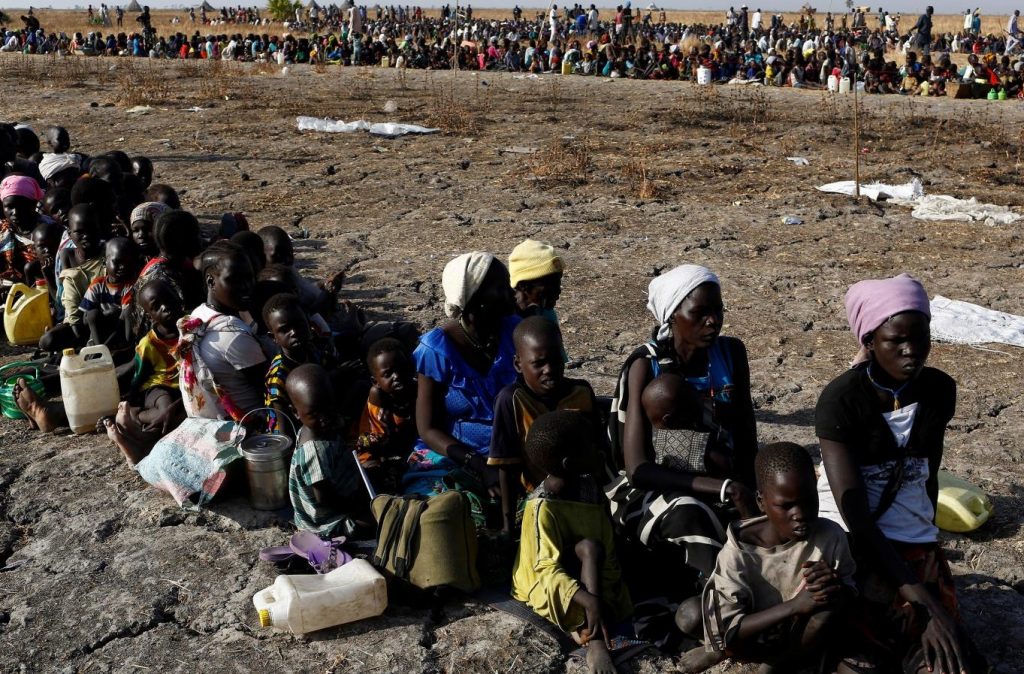Siegfried Modola/Reuters
By
Male Daniel
Concluding a two-day visit to South Sudan – two weeks after localized famine was declared in Mayendit and Leer counties – the Under-Secretary-General for Humanitarian Affairs and Emergency Relief Coordinator, Stephen O’Brien, called for immediate and unhindered access to people in need of aid and urgent funding for the humanitarian appeal.
“Yesterday, I visited Ganyiel, where I met with people who had fled fighting, fear and famine in Leer and Mayendit, as well as hunger and insecurity in Lakes,” said the Emergency Relief Coordinator. “An elderly woman walked for days through swamps from Leer, with her ten-month-old grandson on her back, after they were separated from the rest of their family during fighting. Her grandson is now receiving treatment for severe acute malnutrition. We urgently need additional funding to scale up, sustain and expand life-saving assistance and protection across all of South Sudan.”
The humanitarian crisis in South Sudan is rapidly escalating, and hunger and malnutrition have reached new disturbing levels. Fighting, insecurity and lack of access to aid have left some 100,000 people facing starvation and a further 1 million are on the brink of famine. More than 3.4 million people have been displaced since the conflict began in December 2013, including 1.9 million internally displaced and more than 1.5 million who have fled to neighbouring countries as refugees.
By July 2017, the humanitarian community estimates that 5.5 million will be severely food insecure. “This is only the beginning of the lean season and, sadly, things could get much, much worse in the months ahead,” said Mr. O’Brien. “We desperately need the fighting to stop. We need calm to prevail now so that we can consistently reach people in dire need, and prevent further catastrophe.”
In addition to an already massive humanitarian operation, in response to the declaration of famine, humanitarian organizations have scaled up the provision of food and emergency livelihoods assistance, nutritional supplements, health services, and water, sanitation and hygiene. Already, more than 338,000 people in Leer, Mayendit, Koch and Panyijiar have received humanitarian assistance.
Aid workers continue to face multiple obstacles to the delivery of humanitarian assistance across South Sudan, including active hostilities, access denials and bureaucratic impediments. Frequently, they have to be relocated due to insecurity, escalating tensions or directives from authorities, including recently from Mayendit. Humanitarian compounds and supplies have been repeatedly looted, most recently during clashes in Mayendit, Jonglei and Kajo-Keji town.
During his two-day visit, Mr. O’Brien also met with humanitarian partners and Government officials. “The root cause of this suffering is conflict,” he said, reflecting what he stressed in his meetings. “People have been displaced, brutalised and raped. They have been attacked when they sought out assistance. This must stop, and it must stop now.” The Emergency Relief Coordinator demanded immediate full and unimpeded humanitarian access and reminded parties to the conflict that International Humanitarian Law must be respected and civilians protected.
Before leaving the country, the Emergency Relief Coordinator said: “We have a plan. We are already responding. We are ready to scale up. Now we need the access and the funds to safe even more lives.” The 2017 Humanitarian Response Plan calls for $1.6 billion to reach some 5.8 million people in need.



This article is a very heart-rending account of the appalling and desperate situation of the malnourished South Sudanese, and the threat of famine that hangs over millions more. The Horn of Africa is also undergoing its own danger of famine. Refugees from South Sudan pour out of the newly independent nation, and the authorities seem unwilling or unable to solve the political and economic crisis that produced this sad situation. While the manoeuvres of outside powers may appear to be remote from the daily concerns of the South Sudanese, they are actually having a direct impact on life in that country. Let us not forget that the independence of South Sudan, and its removal from the main body of the Sudan to the north, has been a decades-old objective of the imperialist countries, namely the United States and Britain. The 2011 partition of Sudan was the result of prolonged intervention and support by the outside powers into the politics and ethnic antagonisms of the Sudan. The regime in Khartoum is widely known to be an Islamic dictatorship, imposing its Islamist policies by force. Sudanese activists have been tortured, wrongfully imprisoned and killed by this regime in Khartoum. Sudanese president Omar al-Bashir is known to possess billions of dollars in bank accounts overseas. None of this information, nevertheless, negates the fact that outside powers, such as the United States and Israel, have cynically supported the South Sudanese quest for independence, in order to detach that country from its north, and thus advance their own economic interests into the newly partitioned nation. The July 2011 partition was orchestrated to assert American obejctives in relation to the oil wealth of Sudan, whose central government in Khartoum had embraced significant Chinese economic involvement in the oil sector. The 2005 Comprehensive Peace Agreement (CPA) Washington escalated its support for the leaders of the Sudan People’s Liberation Movement (SPLM), propelling them into the leadership of the South Sudanese state. The latter had received support and training from the state of Israel, which hypocritically exploited the religions divisions of the largely Christian and animist South against the mainly Arabic and Islamic north of the Sudan. In fact, the substantial Christian South Sudanese refugee groups in the West, including Australia, have played up this Christian-versus-Islamic angle to procure public support for their cause. Ironically, as Chinese influence as increased in Khartoum, so too has Chinese influence increased in the South Sudan. The machinations of outside powers have not only imposed a criminal regime in Juba, but have also contributed to the collapse of a functioning society in South Sudan. Israeli and American declarations of support for South Sudanese independence were nothing but hypocritical pledges to exploit the struggle of the Southern Sudanese to satisfy their strategic interests. The US-supported Egyptian military dictatorship is also fishing in troubled waters, sending weapons and ammunition to South Sudanese forces loyal to President Kiir, and has undertaken bombing raids on those factions of the SPLM opposed to President Kiir. The Ugandan government, itself allied to the United States, has demanded military intervention in South Sudan, motivated by a requirement to stop the outflow hundreds of thousands of refugees. The regional powers are gearing up to possibly turn South Sudan into a larger conflagration. South Sudan is now joining the list of countries that are the targets of predatory US imperialist policies, and undergoing the consequent suffering. This is not meant to minimise the disastrous humanitarian impact in South Sudan - far from it. The famine currently engulfing South Sudan is entirely human-made. The inability of the SPLM government to maintain any semblance of order and establish a functioning society has also contributed to the current situation. Six years after the 2011 partition, it is time to observe that the partition of Sudan was a tragic mistake, and the people that contributed to that outcome must be held accountable for the suffering that has followed in its wake.